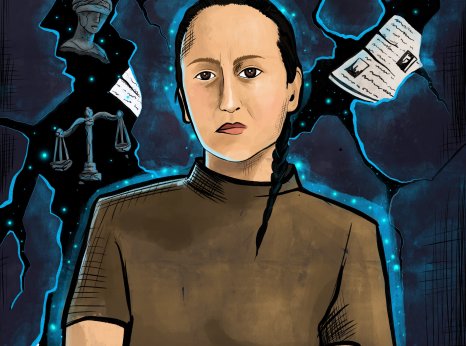Georgia: Georgian Journalist May Lose Eyesight In Jail

Mzia Amaghlobeli, a prominent Georgian journalist and co-founder of media outlets Batumelebi and Netgazeti, was arrested twice on 11 January 2025 during peaceful protests in the city of Batumi in south-western Georgia. Her first arrest was arbitrary and related to her attempting to post a sticker on a building calling for a nationwide protest. Numerous other peaceful protesters were also arbitrarily arrested alongside Mzia Amaghlobeli. After her release, she returned to the protest venue, where her verbal altercation with Batumi Police Chief Irakli Dgebuadze over arbitrary arrests of peaceful protesters, led to her slapping him on the cheek. She was immediately detained. In publicly available video footage, the police chief and other officers are heard threatening and swearing at her while she is being led away. Mzia Amaghlobeli later told her lawyer that Irakli Dgebuadze and other officers continued verbally abusing her in custody, and that he attempted to assault her physically but was stopped by his colleagues. For three hours, she was denied access to her lawyer, and to water and washroom facilities.
Mzia Amaghlobeli was remanded in custody on the charge of “attacking a police officer” (Article 351(1) of the Criminal Code). On 14 January, in a swift hearing, the judge refused her bail. Mzia Amaghlobeli went on a hunger strike for 38 days in protest against the violation of her human rights.
The Special Investigation Service (SIS, a stand-alone agency responsible for investigating alleged crimes by law enforcement officers) was informed about the incident on 12 January, and on 15 January Mzia Amaghlobeli provided a detailed report of her ill-treatment by police. There are conflicting reports as to when the SIS formally launched an investigation into the 11-12 January events in Batumi. Mzia Amaghlobeli’s defence allege the SIS failed to do so until 17-18 January, when it came under pressure from a local rights watchdog, and backdated its records to 13 January. At least three other protesters arrested in Batumi on 11 January, have reported beatings and other ill-treatment by law enforcement officers while in detention. At the time of writing, the SIS has not reported any progress in its investigation, nor recognized either Mzia Amaghlobeli or any other complainants as victims of the alleged crimes by police.
Mzia Amaghlobeli suffers from keratoconus, a progressive eye disease that causes the cornea to thin and bulge outward into a cone shape, severely affecting vision. Before her detention, she had already lost nearly all sight in her left eye and retained only partial vision in her right. A medical examination conducted in February 2025 revealed a sharp deterioration in her right eye — now only 10% functional, with correction possible to just 40%. Despite her legal team submitting medical documentation and requesting a transfer to an ophthalmology clinic, the penitentiary system has failed to facilitate her transfer or provide her with adequate care, putting her at serious risk of irreversible damage.
At her latest court hearing on 14 July 2025, attended by dozens of supporters and diplomats from several EU countries, Mzia Amaghlobeli gave testimony describing her treatment in detention. She stated that Batumi Police chief repeatedly entered her holding room, shouted insults at her, spat on her, and ordered guards to deny her access to water and toilet facilities.
The details of Mzia Amaghlobeli’s arrest, alleged ill-treatment in detention, and trial, give rise to strong concerns over the likely motivation for her prosecution, and contrasted with the apparent impunity enjoyed by the police, demonstrate her and other protesters’ discriminatory treatment by the criminal justice system in Georgia. Her case also highlights broader concerns about politically motivated prosecutions, suppression of peaceful dissent, and gender-based reprisals against those exercising their right to protest in Georgia. The insults and abuse directed at her by senior police officials demonstrate a clear attempt to degrade and intimidate her as a woman. Her treatment is not an isolated incident but reflects a broader pattern in which women in Georgia who challenge authority, particularly in political and protest contexts, are targeted with additional hostility and abuse.